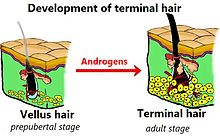Terminal hair
This article provides insufficient context for those unfamiliar with the subject. (December 2019) |

In humans, terminal hair is a variant of hair that is thick and long such as that growing on the scalp, as compared with vellus hair, colloquially known as peach fuzz, growing elsewhere.[1][2] During puberty, the increase in androgenic hormone levels causes vellus hair to be replaced with terminal hair in certain parts of the human body.[3] These parts will have different levels of sensitivity to androgens, primarily of the testosterone family.[4]
The pubic area is particularly sensitive to such hormones, as are the armpits which will develop axillary hair.[5] Pubic and axillary hair will develop on both men and women, to the extent that such hair qualifies as a secondary sex characteristic,[6] although males will generally develop terminal hair in more areas. This includes facial hair, chest hair, abdominal hair, leg and arm hair, and foot hair.[7] Human females on the other hand generally retain more of the vellus hair.[8]
These hairs are present in the large apes but not in the small apes like gibbons and represent an evolutionary divergence.[9]: 193 [better source needed]
See also
[edit]References
[edit]- ^ "What is meant by the terms vellus hair and terminal hair?". www.wfmj.com. 5 December 2019.
- ^ Marks, James G; Miller, Jeffery (2006). Lookingbill and Marks' Principles of Dermatology (4th ed.), Elsevier Inc., p. 11. ISBN 1-4160-3185-5
- ^ Hiort, O. "Androgens and Puberty". Best Practice & Research Clinical Endocrinology & Metabolism, Vol. 16, No. 1, pp. 31–41.
- ^ Neal, Matthew; Lauren M. Sompayrac. How the Endocrine System Works. Blackwell Publishing, 2001, p. 75.
- ^ Randall, Valerie A.; Nigel A. Hibberts, M. Julie Thornton, Kazuto Hamada, Alison E. Merrick, Shoji Kato, Tracey J. Jenner, Isobel De Oliveira, Andrew G. Messenger. "The Hair Follicle: A Paradoxical Androgen Target Organ", Hormone Research, Vol. 54, No. 5–6, 2000.
- ^ Heffner, Linda J. Human Reproduction at a Glance. Blackwell Publishing, 2001, p. 33.
- ^ Robertson, James. Forensic Examination of Hair, CRC Press, 1999, p. 47.
- ^ Neal, Matthew; Lauren M. Sompayrac. How the Endocrine System Works. Blackwell Publishing, 2001, pp. 70, 75.
- ^ Kane, Jonathan; Willoughby, Emily; Michael Keesey, T. (2016-12-31). God's Word or Human Reason?: An Inside Perspective on Creationism. Inkwater Press. ISBN 9781629013725.
